Suchergebnisse
Stadt-Land-Klima: 4 Ortsteile – 1 gemeinsamer Fahrplan für ein klimaneutrales Gratwein-Straßengel
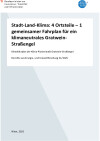
Klimafahrplan der Klima-Pionierstadt Gratwein-Straßengel
Schriftenreihe
41/2025
Seval Brkic, Ernst Rainer, Gerhard Lang, Markus Frewein, Jakob Seidler
Herausgeber: BMIMI
Deutsch, 20 Seiten
Downloads zur Publikation
Richt- und Zielwerte für Siedlungen zur integralen Bewertung der Klimaverträglichkeit von Gebäuden und Mobilitätsinfrastruktur in Neubausiedlungen
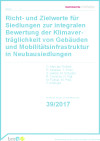
Entwicklung und Abstimmung von Kennwerten für die energetische und ökologische Bewertung von Siedlungen auf Basis der Schweizer 2000-Watt-Arealzertifizierung. Die Ergebnisse bilden einen weiteren Baustein zum Aufbau eines Qualitätssicherungssystems für Siedlungen ähnlich der klimaaktiv Deklaration für Gebäude bzw. der e5 Zertifizierung für Gemeinden.
Schriftenreihe
39/2017
Herausgeber: BMVIT
Deutsch, 118 Seiten
Downloads zur Publikation
DALEC - Day- and Artificial Light with Energy Calculation
Entwicklung eines Online-Konzeptanalysetool für ArchitektInnen, BauingenieurInnen, LichtplanerInnen und Bauherrn, welches trotz einer einfachen Handhabung und kurzen Berechnungszeiten, die komplexen lichttechnischen und thermischen Vorgänge in einem Gebäude abbildet und Heiz-, Kühl- und Kunstlichtbedarf anschaulich bewertet. Zudem wurde das Nutzerverhalten (z.B. Blendschutz) berücksichtigt und visuelle und thermische Komfortkriterien analysiert. Diese neuartige und innovative, gesamtheitliche Betrachtung ermöglicht eine nachhaltige und energieeffiziente Entwurfsplanung für Neubau und Sanierung.
THERM-opti-BALKON: Thermisch optimierte Balkonsanierung
Bei der thermischen Sanierung von Gebäuden stellen frei auskragende Balkone ein besonderes Problem dar. Das Projekt hatte zum Ziel, die Grundlagen für die Entwicklung eines praxistauglichen und kostengünstigen Befestigungssystems zu schaffen, das die thermisch entkoppelte Wiedererrichtung der Balkone im Zuge der Sanierung erlaubt und damit die Effizienz der Wärmedämmmaßnahme deutlich verbessert.
Weiterführende Untersuchungen und Monitoring der grünen Wände am GRG7 Kandlgasse
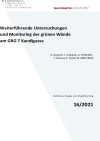
Anknüpfend an das abgeschlossene Forschungsprojekt „GrünPlusSchule“, in dessen Rahmen verschiedene Begrünungsmaßnahmen an und in einer Schule im 7. Wiener Gemeindebezirk (GRG7) umgesetzt werden konnten, greift das vorliegende Folgeprojekt weitere offene Fragen auf und widmet sich detaillierten Messdatenauswertungen zu den Auswirkungen der Innen- sowie Außenbegrünungen.
Schriftenreihe
16/2021
A. Korjenic, J. Hollands, A. Pichlhöfer, T. Gonaus, E. Sesto, M. Mitterböck
Herausgeber: BMK
Deutsch, 98 Seiten
Downloads zur Publikation
Digitization in the construction and real estate industry
In the multitude of digital possibilities, it is very difficult to maintain an overview, to assess trends and potentials, and to recognize correlations. This report therefore aims to describe the current state of the art and the market assessment of promising digital technologies. Information is provided on concrete use cases, added value and challenges of the respective technologies. The analyses presented serve to assess the potential and set the strategic course for the integration of the currently most important digital technologies in the construction and real estate industry.
Webinar: Regulatory Sandboxes als neues Instrument für nachhaltiges Bauen und Sanieren
24. Juni 2024, 16.00 – 17.30 Uhr
Online via Zoom
Wie können Regulatory Sandboxes dazu beitragen, Spannungsfelder im Bereich des nachhaltigen Bauens zu adressieren - vom Holzbau über die Verminderung des Flächenverbrauchs bis hin zum Einsatz von Künstlicher Intelligenz? Ergebnispräsentation des Forschungsprojekts „Green Sandbox Builder".
Österreichische Massivbaustoffherstellung: Impulsgeber für Regionen
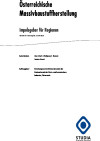
Analyse sozial- und regionalwirtschaftlicher Effekte österreichischer Werksstandorte
Wolfgang E. Baaske, Sandra Kranzl
Deutsch, 80 Seiten
Downloads zur Publikation
Digital transformation of the Austrian construction industry and its impact on employment
What are the impacts of the digital transformation of the Austrian construction industry on this sector’s labour market? By looking at the next five to ten years it will be analysed whether and to what extent digital applications lead to an increasing, falling or stagnant demand for employees in the construction industry and in construction occupations.
Lüftungskonzept Österreich
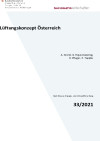
Ziel des Projektes ist die Schaffung eines Nachweisverfahrens (auf Basis Microsoft-Excel), welches zeigt, ob eine natürliche Lüftung bzw. Fensterlüftung bei einer Standardnutzung zur Vermeidung von Schimmelbildung ausreichend, bzw. in Hinblick auf eine ausreichende hygienische Luftqualität zumutbar ist.
Schriftenreihe
33/2021
A. Greml, G. Rojas-Kopeinig, R. Pfluger, P. Tappler
Herausgeber: BMK
Deutsch, 87 Seiten
Downloads zur Publikation
M-DAB2: Materialintensität der Innenentwicklung - Ressourcenbewertung und Lokalisierung städtischer Entwicklungspotenziale
Bei der Bewertung von Innenentwicklungspotenzialen wurde erstmals auch die Materialintensität der Innenentwicklung (anfallende Stoffmengen) für unterschiedliche Entwicklungsvarianten berücksichtigt. Dabei wurde ein Methodenset zur holistischen Bewertung von Potenzialflächen und verschiedene Entwicklungsvarianten und -szenarien zur ressourcenschonenden Innenentwicklung geschaffen.
REGOreal - 100% Erneuerbare Energie Region: Lokale Energie Gemeinwohl Oekonomie im Reallabor für vernetzte Energie- und Mobilitätszellen
In REGOreal geschieht die Sondierung für eine 100% Erneuerbare Energieregion im Raum Retz-Horn-Krems-Tulln (NÖ) sowie Mallnitz (Ktn). Es gibt vier Fokusthemen: 100 Erneuerbare Energie-Gemeinschaften (EEG), 1.000 Gebäudesanierungen, 10.000 Energie-Exporteure und -Exporteurinnen (im Sinne der Mitarbeiter:innen, welche den Ansatz ins private Umfeld tragen) und 100.000.000 km nachhaltiger Mobilität mit umfassender Nutzung von IT für die Entwicklung lokaler integrierter Energyiesysteme (IES) zur Einbindung eines bunten Mix unterschiedlicher Akteure und Akteurinnen und Objekte.
Thermische & stoffliche Grauwassernutzung zur klimatisch wirksamen Gebäudebegrünung und erneuerbaren Warmwasserbereitung (greenWATERrecycling)
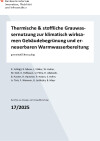
Entwicklung eines Systems zur stofflichen und thermisch-energietechnischen Grauwasserfiltratsverwertung zur Bewässerung von Gebäude- und Fassadenbegrünungen zur Reduktion des Energieverbrauchs der Warmwasserbereitstellung und des Wasserverbrauchs von Begrünungssystemen.
Schriftenreihe
17/2025
K. Schlögl, R. Mixan, J. Völker, W. Huber, M. Gräf, K. Hofbauer, U. Pitha, R. Allabashi, B. Pucher, R. Hammer, P. Holzer, S. Hofer, A. Türk, F. Wimmer, G. Jedliczka, B. Mayr Berichte aus
Herausgeber: BMIMI
Deutsch, 112 Seiten
Downloads zur Publikation
Monitoring of multi-family houses “Tonpfeifengasse”
Evaluation of activated building parts as heat storage for renewable energy shown on the example of the multi-family houses "Tonpfeifengasse".
Langzeitevaluierung des Energieverbrauchs von 100 energieeffizienten Gebäuden in Österreich als repräsentativer Querschnitt österreichischer Leuchtturmobjekte (LZE 100 Leuchtturmobjekte)
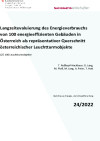
Erfassung, Auswertung und Analyse von Energieverbrauchsdaten von 100 energieeffizienten Gebäuden in Österreich über eine Betriebszeit von 3 bis 25 Jahren als repräsentativer Querschnitt der österreichischen Leuchtturmobjekte. Differenzierung nach Gebäudetypen, Energieträger und Ermittlung der realen Treibhausgas-Emissionen. Vergleich der gemessenen Verbräuche zu Benchmark-Werten.
Schriftenreihe
24/2022
T. Roßkopf-Nachbaur, G. Lang, M. Ploß, M. Lang, A. Peter, T. Hatt
Herausgeber: BMK
Deutsch, 143 Seiten
Downloads zur Publikation
LehB:klimafit! Live in existing buildings today: climate fit together
The aim of the project is to explore transferable renovation concepts for the implementation of climate-fit renovations in Vienna. Integrally optimized renovation packages will be developed, which will be optimized in the building ensembles for implementation-probable, climate-friendly overall solutions with the relevant stakeholders.
DALEC - Day- and Artificial Light with Energy Calculation
In the course of DALEC an online concept evaluation tool for architects, building engineers, lighting designers and building owners was developed. Although easy to use, the software accounts for the complex thermal and light processes in buildings and allows a simple evaluation of heating, cooling and electric lighting loads. Not only energy, but also user behavior were considered (e.g. in terms of glare protection) and visual and thermal comfort were evaluated. This novel and innovative, holistic approach makes sustainable and energy efficient building design possible for new buildings as well as refurbishment.
BMK Highlights der Bauforschung & Ausrichtung der nationalen Bauforschung ab 2024
16. Oktober 2023, 13:00 - 17:30 Uhr
Technische Universität Graz, Kronesgasse 5, 1. Obergeschoß, 8010 Graz
Die Veranstaltung war ein Partner-Event der Impact Days des RENOWAVE Kongresses und präsentierte aktuelle Ergebnisse der angewandten Bauforschung mit Fokus auf nachhaltige Lösungen für klimaneutrale Gebäude und Quartiere.
Innovationskongress: Digitales Planen, Bauen & Betreiben
30. November 2023, ab 9:30 Uhr
aspern Seestadt, ARIANA, Christine-Touaillon-Straße 4, 1220 Wien
Der Innovationskongress richtet den Blick auf die Zukunft der Bau- und Immobilienbranche.
Ergebnisband "Sanierung"
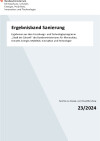
Der vorliegende Ergebnisband stellt abgeschlossene Projekte aus dem Forschungs- und Technologieprogramm „Stadt der Zukunft“ des Bundesministeriums für Klimaschutz, Umwelt, Energie, Mobilität, Innovation und Technologie (BMK) im Bereich innovativer Gebäudetechnologien vor. Die gewonnenen Erkenntnisse sollen eine Entwicklung in Richtung energieeffiziente und klimaverträgliche Stadt unterstützen, die auch dazu beiträgt, die Lebensqualität und die wirtschaftliche Standortattraktivität zu erhöhen.
Schriftenreihe
23/2024
Bianca Pfefferer
Herausgeber: BMK
Deutsch, 28 Seiten
